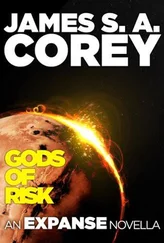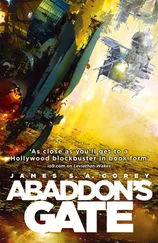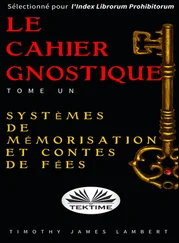James Corey - Babylon's Ashes
Здесь есть возможность читать онлайн «James Corey - Babylon's Ashes» весь текст электронной книги совершенно бесплатно (целиком полную версию без сокращений). В некоторых случаях можно слушать аудио, скачать через торрент в формате fb2 и присутствует краткое содержание. Год выпуска: 2016, ISBN: 2016, Издательство: Orbit, Жанр: Старинная литература, на английском языке. Описание произведения, (предисловие) а так же отзывы посетителей доступны на портале библиотеки ЛибКат.
- Название:Babylon's Ashes
- Автор:
- Издательство:Orbit
- Жанр:
- Год:2016
- ISBN:9780316334747
- Рейтинг книги:4 / 5. Голосов: 1
-
Избранное:Добавить в избранное
- Отзывы:
-
Ваша оценка:
- 80
- 1
- 2
- 3
- 4
- 5
Babylon's Ashes: краткое содержание, описание и аннотация
Предлагаем к чтению аннотацию, описание, краткое содержание или предисловие (зависит от того, что написал сам автор книги «Babylon's Ashes»). Если вы не нашли необходимую информацию о книге — напишите в комментариях, мы постараемся отыскать её.
Babylon's Ashes — читать онлайн бесплатно полную книгу (весь текст) целиком
Ниже представлен текст книги, разбитый по страницам. Система сохранения места последней прочитанной страницы, позволяет с удобством читать онлайн бесплатно книгу «Babylon's Ashes», без необходимости каждый раз заново искать на чём Вы остановились. Поставьте закладку, и сможете в любой момент перейти на страницу, на которой закончили чтение.
Интервал:
Закладка:
Her cabin was smaller than the house with two tiny bedrooms, a little sitting area with a scruffy wall screen, and just enough storage for their personal items. There were twenty like it in their hall, with a shared lavatory at one end and a cafeteria at the other. Four halls like hers on the deck. Ten decks on the ship. Right now, Nono was at the galley on deck three singing with a bluegrass quartet. The youngest of the musicians—a rail-thin, red-haired man named Jacques Harbinger—had used almost his whole personal space allotment on a real hammer dulcimer. Nami would be coming back from school on deck eight, where Kerr Ackerman was using the ship tutorials to teach the two hundred or so children about biology and survival techniques tailored for Eudoxia. After they both came home and they’d all had dinner in their own galley, Anna was going to the Humanist Society meeting on deck two, where she’d already won the role of the loyal opposition to George and Tanja Li, the young atheist couple who ran it. She didn’t fool herself into believing anyone would change anyone else’s mind. But the trip was long, and a good philosophical discussion passed the hours pleasantly. Then home to work on her sermon for next week.
She remembered something she’d read, she didn’t know where, about the life of ancient Greece. The private space had been thin there too, most of people’s hours spent in the streets and courtyards of Athens and Corinth and Thebes. A world where everyone’s home was not their castle but their dorm room. It was exhausting, but exhilarating too. She could already see the early shapes of the community they would eventually become. And the efforts she made now would have an effect on what happened when they reached their new home planet. The decisions they made in building their township would be the seed crystal for the city that might one day rise up from it. A few hundred years, and the work Anna did now to make this group a kind, thoughtful, centered one might be able to shape a whole world.
And wasn’t that worth a little extra effort?
She heard Nami’s voice before the door opened, serious and percussive the way she got when she was focused on something. She didn’t talk to herself often, so Anna assumed she had someone from school with her. When the door opened, she was proven right.
Nami walked into the little common room, practically dragging a sullen Arab boy behind her. He started a little when he saw Anna. She smiled without showing her teeth, didn’t quite make eye contact, didn’t move. She’d learned more about how to be with traumatized people in the last year than she’d ever hoped to know, and much of what she came to understand was that humans were domestic animals like dogs and cats. They responded poorly to threats and well to a gentle building of trust. Not rocket science, but easy to forget.
“This is Saladin,” Nami said. “We have a group project.”
“Good to meet you, Saladin,” Anna said. “I’m glad you could be here.”
The boy nodded once, looked away. Anna had to resist the urge to try to draw him out, ask him where he lived, who his parents were, how he liked his classes. She was always impatient to help people, even when they weren’t ready to be helped. Maybe especially then.
Nami, nattering about the great-man theory and technological ratchets and railroading time as if to fill the conversation for both of them, went to her bedroom and came out with her school tablet. Anna hoisted an eyebrow. “That’s been here all day?”
“I forgot it,” Nami said lightly. Then, “Bye, Mom,” as she marched out the door.
Saladin hesitated like he was surprised to have been left alone with a grown-up. Anna looked close to him, but not straight on. He nodded and ducked out the door after her daughter. She waited for one breath, and then another, and then—knowing it was a bad idea—crept to the closed door and peeked out. Nami and Saladin were walking down the narrow ship corridor, squeezing close to be side by side. His right hand was in her left, and as far as Anna could see, Nami was still talking animatedly about whatever she was talking about while Saladin, rapt, listened.

“So what’s your group project?” Anna asked.
Dinner that night was spiced beans and rice that very nearly mimicked the real thing. Nono was tired after her rehearsal, and Anna was expecting the Humanist meeting to be intense and a little taxing, so they’d taken the food back to their rooms instead of staying in the galley. Nami sat cross-legged with her back against the door while Anna and Nono took two of the chairs that folded down out of the wall. The walls were close enough that even though they were on opposite sides of the room, their knees almost touched. It would be almost a year living in the Abbey . By the time they reached Eudoxia, they might not remember what open space felt like anymore.
“History,” Nami said.
“Big subject,” Anna said. “Any particular part of history?”
Nono looked up at her from under her eyebrows, so maybe Anna wasn’t being quite as casual and nonchalant as she thought. Nami didn’t seem to notice anything, though.
“No. All of it. We’re not talking about what happened in history, we’re talking about what history is. So, you know”—she gestured in a circle with her spoon—“is the important thing about history the people who actually did things, or if they hadn’t been alive, would the same basic things have happened, just with other people doing them? Like with math.”
“Math?” Anna said.
“Sure,” Nami said. “Two different people came up with calculus right at the same time. So maybe everything’s like that. Maybe it doesn’t matter who leads a war because the things that made the war happen weren’t leaders. They were how much money people had or how good their land was for making food or something. That’s the section I’m writing. Saladin’s writing about the great-man theory, but it’s old because they only talk about men.”
“Ah,” Anna said, cringing at how obvious she felt. “Saladin’s doing that?”
“It’s about the idea that without Caesar, there wouldn’t have been a Roman Empire. Or without a Jesus, there wouldn’t have been Christianity.”
“Hard to argue against that,” Nono said.
“It’s a history class. We’re not talking about the religious part. And then Liliana’s doing the section on the technological ratchet, where the thing that changes is how well we understand how to make things like medicines and nuclear bombs and Epstein drives, and that everything else about history is cyclic. The same things happen over and over again, but it just seems different because we have different tools.” Nami frowned. “I don’t understand that one yet. But it’s not my section.”
“And what do you think?” Anna asked.
Nami shook her head and scooped up a last spoonful of almost-beans. “It’s dumb to break it up like that,” she said around her food. “Like it’s one thing or it’s something else. That’s not how it ever is. It’s always that there’s somebody who does whatever it is. You know, conquers Europe or decides that it’s a great idea to line aqueducts with lead or figures out how to coordinate radio frequencies. You never have one without the other. It’s like nature versus nurture. When do you ever see one without the other?”
“That’s a good point,” Anna said. “So how does the project work?”
Nami rolled her eyes. Oh God, they were in eye-rolling ages now. It seemed so recent that her little girl had been free of contempt. “It isn’t like that.”
“What isn’t like what?”
“Mother. Saladin isn’t my boyfriend. His parents died in Cairo, and he’s here with his aunt and uncle. He really needs friends, and anyway Liliana likes him, so even if I did, I wouldn’t. We have to be careful. We’re spending our whole lives together, so we need to be really gentle. If we mess it up, it’s not like we can just change schools.”
Читать дальшеИнтервал:
Закладка:
Похожие книги на «Babylon's Ashes»
Представляем Вашему вниманию похожие книги на «Babylon's Ashes» списком для выбора. Мы отобрали схожую по названию и смыслу литературу в надежде предоставить читателям больше вариантов отыскать новые, интересные, ещё непрочитанные произведения.
Обсуждение, отзывы о книге «Babylon's Ashes» и просто собственные мнения читателей. Оставьте ваши комментарии, напишите, что Вы думаете о произведении, его смысле или главных героях. Укажите что конкретно понравилось, а что нет, и почему Вы так считаете.












